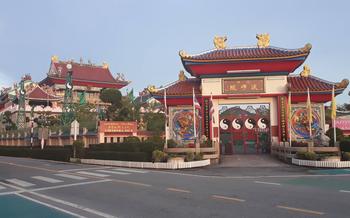
Thai Chinese Cultural Center
- Udon Thani: A City of Culture and History
- Thai Chinese Cultural Center: Preserving Heritage
- Architectural Grandeur:
- Exhibition Halls: A Journey Through History
- Cultural Performances: A Vibrant Showcase
- Workshops and Classes: Embracing Traditions
- Library and Research Center: A Treasure Trove of Knowledge
- Festivals and Events: Celebrating Diversity
- Chinese Temple and Shrines: Spiritual and Cultural Significance
- Language Learning Opportunities
- Guided Tours: Unveiling Hidden Stories
- Accessibility and Facilities
Udon Thani: A City of Culture and History
Udon Thani, a province in northeastern Thailand, holds a rich historical and cultural tapestry. It was founded in 1894 as a strategic military base to protect the region from French colonial expansion. The city rapidly grew, attracting diverse ethnic groups, including the Chinese, who brought their traditions and customs to the area. Udon Thani became a melting pot of cultures, blending Thai and Chinese influences, which are still evident today. As the gateway to northeastern Thailand, Udon Thani plays a crucial role in the region's economic and cultural development, serving as a vibrant hub for trade, commerce, and cultural exchange.
Thai Chinese Cultural Center: Preserving Heritage
Established in 2007, the Thai Chinese Cultural Center stands as a testament to the rich cultural heritage shared between Thailand and China. Its mission is to promote cultural exchange, understanding, and cooperation between the two nations, fostering a deeper appreciation for their shared history and traditions. The center collaborates closely with local communities, organizing events, workshops, and educational programs to engage the public and preserve cultural practices. Through these initiatives, the Thai Chinese Cultural Center plays a vital role in safeguarding the unique cultural identity of Udon Thani and northeastern Thailand.
Architectural Grandeur:
The Thai Chinese Cultural Center stands out with its unique architectural design, showcasing a harmonious blend of traditional Chinese and Thai elements. The main building features a striking curved roof, reminiscent of ancient Chinese temples, supported by intricate columns adorned with auspicious symbols. Traditional Chinese motifs and patterns are skillfully incorporated into the facade, adding to the building's aesthetic appeal.
The center also boasts a beautiful garden, meticulously landscaped with lush tropical plants, water features, and winding pathways. The garden provides a serene and tranquil space for visitors to relax and immerse themselves in the cultural ambiance.
The overall design of the Thai Chinese Cultural Center is not only visually appealing but also holds deep cultural significance. It serves as a tangible representation of the fusion of Chinese and Thai cultures, celebrating the rich heritage and shared history of the two countries.
Exhibition Halls: A Journey Through History
The Thai Chinese Cultural Center houses several exhibition halls, each dedicated to a specific aspect of Chinese-Thai history and culture. These halls showcase a diverse collection of artifacts, photographs, and interactive displays that narrate the story of the Chinese community in Thailand. Visitors can learn about the early migrations, the challenges and triumphs of the Chinese immigrants, and their contributions to Thai society.
One of the highlights of the center is the "Chinese Immigration Hall," which depicts the arduous journey that many Chinese undertook to reach Thailand. Through interactive displays and personal accounts, visitors can experience the hardships and hopes of these early immigrants as they left their homeland in search of a better life.
Another must-see exhibition is the "Chinese-Thai Cultural Exchange Hall," which showcases the rich cultural interactions between the two communities. Visitors can admire traditional Chinese crafts, such as porcelain, embroidery, and wood carvings, alongside Thai artifacts that have been influenced by Chinese design and motifs. The hall also highlights the role of Chinese festivals, cuisine, and religious practices in shaping Thai culture.
Overall, the exhibition halls at the Thai Chinese Cultural Center provide a comprehensive and engaging journey through the history and culture of the Chinese community in Thailand. Visitors of all ages can learn, appreciate, and celebrate the diverse heritage that has shaped this vibrant region of northeastern Thailand.
Cultural Performances: A Vibrant Showcase
The Thai Chinese Cultural Center is not just a museum; it's also a vibrant hub for cultural performances. Traditional Chinese and Thai dances come alive on its stage, showcasing the rich heritage of both cultures. The center regularly hosts performances by local artists and troupes, offering visitors a chance to witness the grace and skill of these talented performers.
Music, acrobatics, and martial arts demonstrations further enrich the cultural experience. The center collaborates with local communities to showcase their unique traditions and talents. These performances provide a platform for local artists to share their passion and skills with a wider audience.
Attending a cultural performance at the Thai Chinese Cultural Center is an immersive experience that allows visitors to appreciate the diversity and vibrancy of Chinese and Thai culture. Whether it's the rhythmic beats of Chinese drums, the graceful movements of Thai dancers, or the awe-inspiring feats of martial arts, these performances captivate and entertain visitors of all ages.
Workshops and Classes: Embracing Traditions
The Thai Chinese Cultural Center offers a unique opportunity to learn about and experience Chinese culture firsthand through its workshops and classes. Visitors can immerse themselves in the traditions of Chinese calligraphy, painting, and cooking, gaining hands-on experience and developing a deeper appreciation for the art forms. These workshops are led by experienced instructors who provide guidance and instruction, ensuring that participants leave with a newfound understanding and skill set.
The calligraphy workshops introduce the art of writing Chinese characters, exploring the history, symbolism, and techniques of this ancient art form. Participants learn the basic strokes and principles of calligraphy, practicing on rice paper with traditional brushes and ink. The painting workshops, on the other hand, focus on traditional Chinese painting techniques, using watercolors or ink to create vibrant and expressive artworks.
Cooking classes are also a popular offering at the center, allowing visitors to learn the secrets of authentic Chinese cuisine. Participants can choose from a variety of dishes, such as dumplings, noodles, or stir-fries, and learn how to prepare them using fresh ingredients and traditional methods. These workshops not only teach culinary skills but also provide insights into the cultural significance of Chinese food.
By participating in these workshops and classes, visitors to the Thai Chinese Cultural Center can actively engage with Chinese traditions, learning new skills, preserving traditional knowledge, and gaining a deeper understanding of Chinese culture.
Library and Research Center: A Treasure Trove of Knowledge
The Thai Chinese Cultural Center houses a comprehensive library and research center that serves as a treasure trove of knowledge on Chinese-Thai history, culture, and language. This invaluable resource boasts an extensive collection of books, documents, and research materials, catering to scholars, researchers, and anyone seeking to delve deeper into the rich tapestry of this unique cultural blend.
The library's meticulously curated collection encompasses a diverse range of topics, including Chinese immigration to Thailand, the assimilation and integration of Chinese communities, and the profound influence of Chinese culture on Thai society. Through these invaluable resources, visitors can embark on a journey of discovery, gaining insights into the intricate connections and shared heritage that have shaped the cultural landscape of northeastern Thailand.
Whether you're a seasoned academic or simply a curious traveler eager to learn more about this fascinating region, the Thai Chinese Cultural Center's library and research center is an indispensable resource. Its wealth of knowledge and dedicated staff are sure to enrich your understanding of the deep-rooted ties between China and Thailand, leaving you with a newfound appreciation for the cultural diversity that makes this region so captivating.
Festivals and Events: Celebrating Diversity
The Thai Chinese Cultural Center is not only a place of historical and cultural preservation but also a vibrant hub for festivals and events that celebrate the diversity of the region. The annual Chinese New Year celebration is a major highlight, with colorful parades, lion dances, and traditional performances filling the streets of Udon Thani. Other cultural festivals throughout the year showcase Chinese and Thai traditions, offering visitors a chance to immerse themselves in the rich tapestry of northeastern Thailand's heritage. These events provide a platform for community engagement, cultural exchange, and the preservation of age-old customs, ensuring that the region's vibrant traditions continue to thrive.
Chinese Temple and Shrines: Spiritual and Cultural Significance
Within the grounds of the Thai Chinese Cultural Center, visitors can find a cluster of temples and shrines dedicated to revered Chinese deities. These sacred spaces serve as a testament to the deep-rooted spiritual beliefs and cultural heritage of the Chinese community in Udon Thani. Pilgrims from across the region flock to these temples to pay homage, seek blessings, and participate in religious ceremonies. The intricate architecture, colorful decorations, and serene atmosphere of these sacred sites offer a glimpse into the rich tapestry of Chinese religious practices. Exploring these temples and shrines provides an opportunity for visitors to gain a deeper understanding of the spiritual and cultural significance they hold for the local community.
Language Learning Opportunities
The Thai Chinese Cultural Center offers a unique opportunity for visitors to learn the Chinese language through its comprehensive language classes. These classes are designed for individuals of all levels, from beginners to advanced learners. The immersive environment of the center, with its native Chinese speakers and cultural immersion, provides an ideal setting for language acquisition. Students can enhance their speaking, listening, reading, and writing skills through interactive lessons, cultural activities, and practical exercises. The center's language program is a valuable resource for those seeking to deepen their understanding of Chinese culture and establish meaningful connections with the local community.
Guided Tours: Unveiling Hidden Stories
Enhance your visit to the Thai Chinese Cultural Center by joining one of the guided tours offered in various languages. Knowledgeable guides will take you on a journey through the center's exhibits, providing in-depth explanations of the cultural significance and historical context of each display. They will unveil hidden stories behind artifacts, artworks, and performances, giving you a deeper understanding of the rich heritage showcased at the center. Listen to captivating tales of the Chinese-Thai community, their traditions, and their contributions to Udon Thani's cultural tapestry. Guided tours offer an immersive and educational experience, ensuring that you leave the center with a profound appreciation for the cultural treasures it holds.
Accessibility and Facilities
The Thai Chinese Cultural Center is designed with accessibility in mind, ensuring a comfortable and convenient visit for all. Wheelchair ramps and elevators provide easy navigation throughout the center, allowing visitors of all abilities to fully explore the exhibitions and facilities. Clean and well-maintained restrooms are available, including designated prayer rooms for those who need a quiet space for reflection. Ample parking is provided, including designated areas for tour buses, making it easy for groups to visit the center. These thoughtful touches demonstrate the center's commitment to inclusivity and ensuring a welcoming environment for all visitors.


